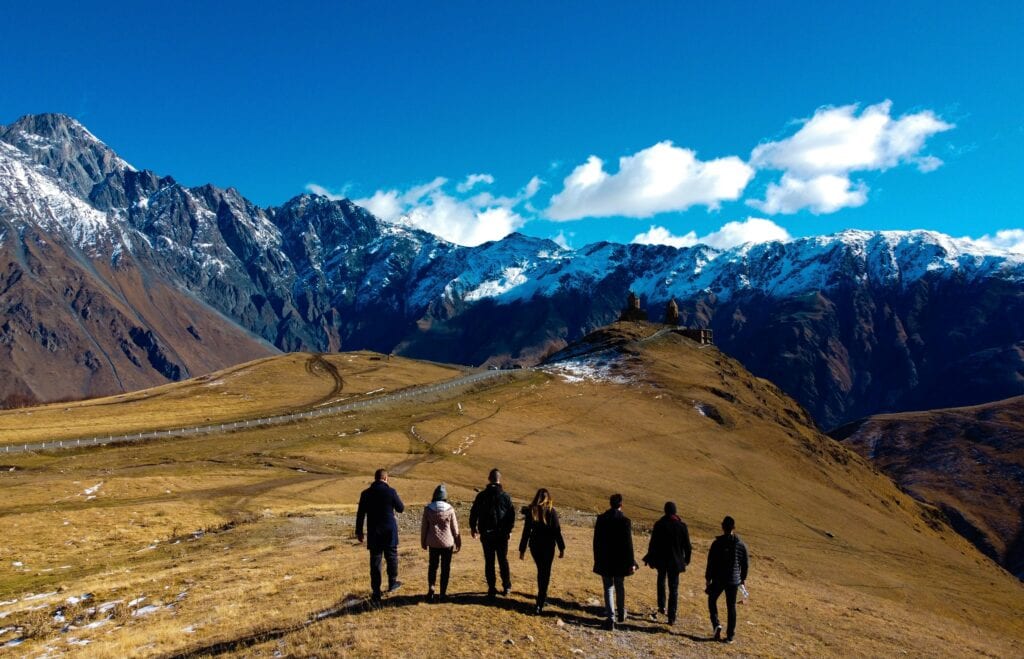|
|
2020 was undoubtedly a highly tumultuous year for the travel industry. Borders were abruptly closed, flights were canceled, and hotels wouldn’t accept guests. Even a couple from South Africa was literally stranded on a remote island. While the travel industry will eventually revert back to some semblance of what it was before the Covid-19 crisis, there very well may be another disruptive force in the travel industry in the coming years and decades. This is the rise of digital nomads. While the idea of working while traveling, in a digital manner, is a relatively new phenomenon, as increasingly more jobs become location independent, it’s likely that more people will pivot to at least a partially nomadic lifestyle.
This is significant because this shift will likely have an impact on the travel industry as a whole. Travel agents, hotels, airlines, and other players in the travel industry as well as related industries like hospitality will certainly be affected. And there are already signals that changes are coming. Countries are offering visas catering to digital nomads, coworking spaces are popping up all around the world, and even the booking platform Kiwi has a “nomad” flight planning section that allows for multiple stop itineraries. It’s likely that these subtle changes are only the beginning.
Digital nomads are also changing the insurance industry, with providers like SafetyWing who provide medical and travel insurance tailored to digital nomads anywhere they go, even trips to their home country.
Nomads vs. Digital Nomads
We have mentioned the “nomad” section on Kiwi, but there is a distinct difference between a nomad and a digital nomad. A nomad is closer to the traditional definition of a wandering person or peoples, similar to those that still wander the Serengeti or the Mongolian steppe. However, in the modern era, it’s more akin to a backpacker or long-term traveler that takes up work to help finance their travels. On the other hand, a digital nomad is more like a traveling businessperson where they work and travel but in a more professional manner. And the work is of course digitally oriented and digital nomads leverage telecommunications technologies to learn a living while conducting their life in a nomadic manner.

The Growing Trend of Digital Nomadism
Since the term digital nomad was first mentioned in the book Digital Nomad by Tsugio Makimoto and David Manners, which was published in 1997, a lot has changed. And while it’s unknown if the term was used before this, this was its entrance into the relative mainstream. In the book, they posit that people will realize that their geographic tie is dissolving and many people in the developed world will be free to live wherever they want and travel as much as they want.
In the United States alone, a study from MBO partners found that there was an increase in those that identified as digital nomads. In 2018 there were about 5 million Americans that identified as such. That number doubled to over 10.9 million digital nomads in the US alone. That means there was a year-over-year increase of 50% in just those two years.
In 2015 Pieter Levels – the founder of Nomad List and Remote OK – while speaking at a conference predicted that there will be 1 billion digital nomads by 2035. The trend can very likely meet the bold prediction of Levels as it’s likely that as younger and digital natives enter the workforce and technologies improve, we will see an exponential increase in digital nomads.

What do Digital Nomads Want?
There are some countries that are better fitting for the digital nomad lifestyle and they often match with what digital nomads want, which is why they are often the most popular locations. The wants and needs are important for digital nomads because some factors like reliable internet and low cost of living have a direct impact on their professional and personal lives. Some other important factors for digital nomads are the weather and the ease of entry to the country and the ability to extend the stay (i.e. the visa regime).
In some cases, these are just “wants”, and not a necessity for a digital nomad. And the level of importance of each of them will likely vary from person to person depending on their profession, level of income, which passport they hold, and so on. It’s just as likely as what one just desires (or doesn’t), another may need.
Why Should A Country Attract Digital Nomads?
For many countries, tourism is the economic backbone and is vital for the success of their respective economy. It boosts the revenues of the national and local economies, creates thousands of jobs, and helps to develop the infrastructure of a country. Particularly with business tourism, there are both direct and indirect economic impacts that it has. Some of the direct economic impacts include hospitality-related expenses of foreigners (hotels, bars, restaurants, etc.), transportation, tour providers, and local grocers. And some indirect economic impacts are the increase in domestic and foreign-born investments into new infrastructure, business facilities, etc. that help to provide jobs and cash injections due to the demand of foreigners visiting the country. And these are only a few direct and indirect positive impacts that tourism brings.
This is related to digital nomads because a key tenet of digital nomadism is living like a local. This includes eating at smaller, local restaurants, purchasing food from grocers, and generally operating in a similar way to locals in general. While they may not spend lavishly for a week or so as a vacationer would, a digital nomad will contribute even more to a local economy. This is because their stay in a country can last from months to even years, which is a much larger contribution than a high-spending individual or family over the course of only one or two weeks. Additionally, while they may still live like a local, the generally higher income coupled with the low cost of living allows for more expenses within the local community.
As infrastructure can be important to not only digital nomads, but tourists in general, investment in things like hospitals, highways, and other infrastructural elements can benefit not only tourists but also the local populations.

Ways Countries Can Attract Digital Nomads
While some may think that the only thing digital nomads want is a beachside bungalow in a tropical country, it’s far from reality. In order for a country to be an attractive location, there are many things that they can do beyond just being beautiful.
Provide A Temporary Worker Visa
The visa regime of a country can affect digital nomads in a number of ways. First, the ease of entry into a country is a key component in attracting digital nomads. If the visa process is long and arduous, then it can be a major turn-off for digital nomads. By providing not only an easy to access visa, but a relatively easy way to extend a visa can allow for not only more digital nomads entering the country but also staying longer. Secondly, by implementing a temporary worker visa that’s easy to access, navigate, and understand you can open the door for many professionals to live and work within the country. And in some cases, you may be even able to collect taxes from their work – that is if you do other things on this list well enough for digital nomads not to mind.
Help Visitors Connect with Each Other and the Local Community
If the local communities are accessible and livable then it also makes it much more attractive for digital nomads. This can include the relative safety of the local community, ease of access, cost of living, etc. While some things are easier to control and some aren’t as they’re dependent on macroeconomic principles, they can do the best they can to foster connections to the local community. Also, to help other visitors or digital nomads help to connect with each other.

Provide High-Speed and Affordable Internet throughout the Country
Perhaps the most important aspect is the level of connectivity within a country. If the internet isn’t stable, or not very accessible then it can be a major turnoff. Additionally, if it is stable and accessible but it’s expensive or too slow, it also can make it more difficult for digital nomads to choose the country.
Infrastructure that allows for Livability
Solid and sound infrastructure (physical and digital) are important factors for digital nomads as well. This includes good public transport, a good road system, an easily accessible airport, etc. The more difficult and uncomfortable it is, the less likely a digital nomad would want to live there.

How Can Businesses & Hotels Attract Digital Nomads?
When it comes to businesses, whether it be in the hospitality industry, travel industry, or tourism industry, they should try to align themselves with the wants and needs of digital nomads. We’ve discussed a few broad topics that digital nomads want, but there are some specific elements that those businesses within the related industries should consider.
Allow Nomads to Unplug
While we’ve highlighted the importance of connectivity, it’s also necessary for digital nomads to unplug as well. This is important because as we’ve seen with the rise in remote work, the line has blurred between work time and free time. And the constant barrage of work-related messages and emails can have detrimental effects on one’s mental health – possibly leading to burnout. So, allowing digital nomads to interact with fellow travelers, be in a “device-free-zone”, or just relax by themselves can help to allow nomads to unplug and disconnect from work.
Allow Nomads to Stay Connected
Of course, at the risk of sounding like a broken record, connectivity is vital. So, staying connected is also important. Businesses can succeed in drawing digital nomads by providing free high-speed internet, coworking spaces, quiet video calling areas, or other amenities that can help nomads stay connected – not only for work but also to reconnect with family and friends around the world.
Allow for Flexibility
The digital nomad life is about as flexible as it gets. Unlike the “normal” life where you may have the same routine for years and years, a digital nomad lifestyle can have something new and different every day. Since the lifestyle itself is far from consistent, by allowing for flexibility you can address one of the main concerns of digital nomads as well. Flexibility should relate to both financial and temporal elements. Meaning that they should be flexible in things like payments and discounts which can include long-term discounts, discounts for paying in advance, or flexible payment options. The business can also be flexible in how long or short a stay may be when it comes to things like a hotel or coworking space. While long-term stays may be more common, what’s less common is very short-term stays (less than one day). This can be useful for a short team meeting or meeting with a client (in-person or online) where a whole day rate is too much.
Promote Local Connectivity
Since loneliness is one of the main problems that digital nomads have, it’s important to address this by staying engaged with the local community but also fellow travelers and digital nomads. By promoting coworking or social events, a business can foster a sense of community and help build interpersonal relationships.
What Does the Future Hold for the Travel Industry?
At the national level, the most obvious change that has already started to take place and will likely expand is the creation of digital nomad work visas. While there have been some countries, like Estonia, that have had some sort of digital nomad visa regime in place for years, more and more countries like Dominica, Antigua, and Portugal have embraced similar concepts.
At the more micro level when it comes to individual businesses and communities, there will be a shift in the various offerings of hotels, tours, and even forms of transportation. It’s likely that more hotels will have apartment-style offerings and the prevalence of co-living spaces will also increase.
Transportation may also be significantly impacted as many people shift from traditional home life to a life on the road in an RV or van. And round-trip flights may have less value as increasingly more people don’t wish to return from where they came from.
Countries and businesses should embrace the change that’s coming so they can receive the benefits and help not only the countries economy but the local communities too.













